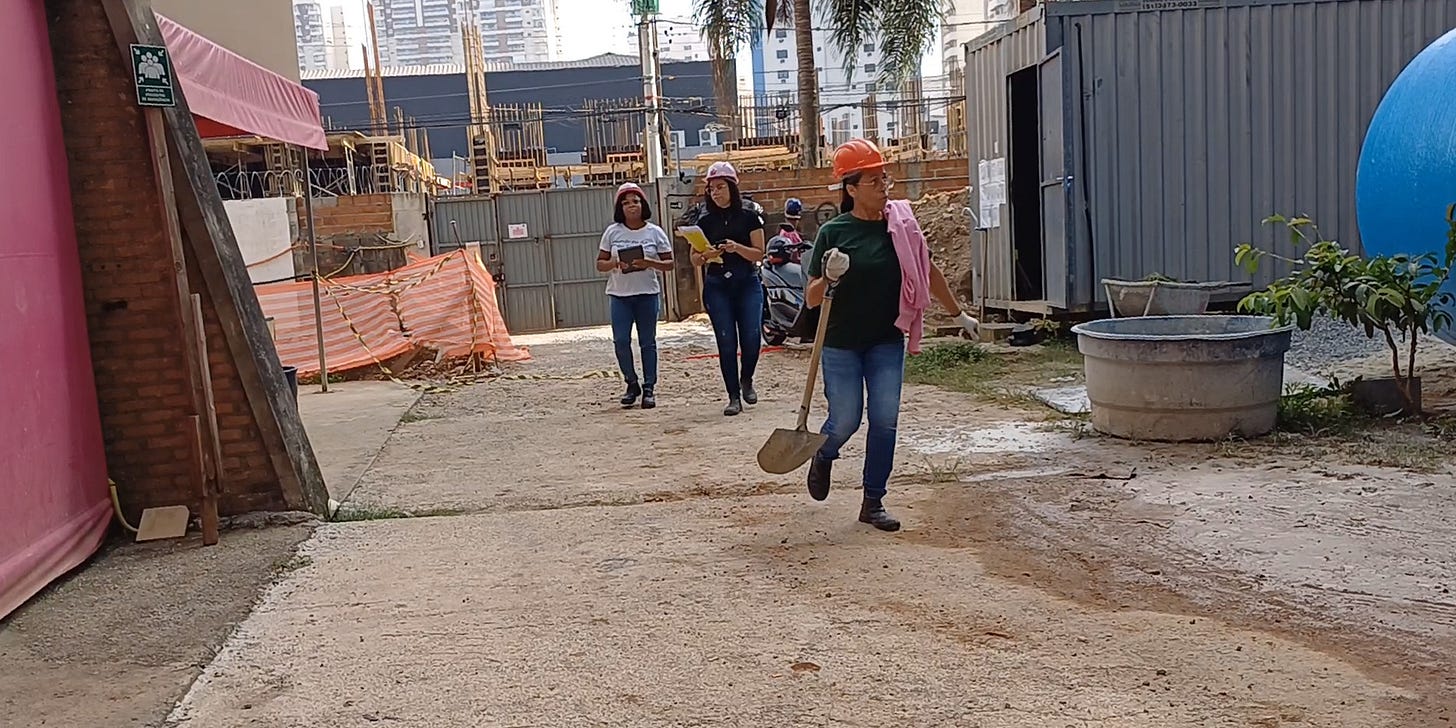Housing Victory in São Paulo
After two years of pressure, National Union for Popular Housing convinces State Government to co-subsidize self management of 30,000 social housing units
A major victory was scored for the housing movements in São Paulo this month when the right-wing state government under the bolsonarista Governor Tarcísio de Freitas agreed to allocate R$600 million in subsidies for the construction of 30,000 social housing units planned by the Federal Government’s housing program, including Minha Casa Minha Vida Entidades, which provides up to 95% subsidy for social movements to manage their own ownership-based construction projects.
Like most housing movement construction projects, the Carolina de Jesus apartment complex project is managed by women
Over the last 35 years, Brazil's largest urban social movement, the National Union for Popular Housing (União Nacional por Moradia Popular / UNMP), has organized self-managed, ownership-based social housing construction for hundreds of thousands of families.
The UNMP was founded in 1989, with support from liberation theology sectors of the Catholic Church, as an extension of a national coalition of working-class housing activists who came together to help draft, gather signatures for, and ratify a people’s amendment to the 1988 Constitution: Article 183, which guarantees that, from a legal standpoint, the social function of property overrides the profit motive. What this means in practical terms, thanks in part to the UNMP, CMP, UMLN, and MST, who worked to pressure the government to further define the conditions of Article 183 during the 1990s, is that “dignified” housing is treated as a basic human right according to Brazilian law. Whereas some movements, like MST and CONTAG in rural areas and the MNLM and CMP in cities, use this right to squat on unproductive tax-scofflaw or stolen land and pressure the government to turn over the deeds, the UNMP has focused on what it refers to as “mutirões”.
A mutirão is a self-managed construction project in which, after acquiring land either by collectively purchasing or squatting on a scofflaw property, the social movement negotiates with the local or federal government to provide heavily subsidized funding—up to 95% of construction costs—in exchange for the sweat equity of the future residents. Normally, this involves technical support by civil engineers from the national mortgage bank, Caixa, which includes design and drafting the blueprints, and hiring a construction company to do the heavy work of building the walls, laying the roof, etc. The future residents receive vocational training, clean and level the land before construction starts, and then do the finishing work, including painting, laying tiles, electrical wiring, and plumbing.
Once they move in, residents are expected to pay five years of monthly installments, which in São Paulo currently range from around US$15 to $70/month, depending on income, before they receive the deeds—which, since Lula first took office in 2003, go into the name of the woman of the family.
According to a new policy implemented by the Lula administration shortly after taking office in 2023, recipients of the Bolsa Família welfare program, senior citizens, and people on disability making less than two times the minimum wage are exempt from monthly payments.
After the Federal Government announced it was restarting the *Minha Casa Minha Vida* housing program shortly after Lula took office in 2023, activists in São Paulo hit a roadblock. The standardized subsidy amount per housing unit of R$170,000 was too low for São Paulo, one of the most expensive cities in Brazil. For two years, the UNMP used an integrated set of pressure tactics to convince the right-wing state government to add additional funding to the program, finally succeeding in April 2025.
“We held protests in the state housing ministry, we held a public hearing in the state parliament, where lawmakers summoned state government representatives to debate with us,” says Evaniza Rodrigues, one of the UNMP’s National Directors. “We helped create a bill for new housing policies that was introduced in the state legislature, but most importantly, we convinced the state government that a social housing project for state residents is important for them, too, because they can add these housing units to the state housing company’s balance at the end of each year.”
The deal struck with the State Government means that each unit financed by the Federal Government will receive an additional R$20,000–R$36,000 in funding. This means that hundreds of projects that have been on hold for two years will now get underway.
During recent filming at the Carolina de Jesus housing project, I spoke to a woman named Edna Nunes as she was painting trim inside her future apartment, which she has been waiting for, as an activist in the UNMP, for 17 years.
**“We do what is within our reach,” she said. “It's a struggle. And this struggle never stops. Even though we may get our own apartment, we'll keep fighting so that other families can get their housing.”
Part of this willingness to help other working class families achieve home ownership has spilled across international borders. After dozens of exchange experiences between members of the UNMP and other housing movements and working class housing activists in Venezuela, President Nicolas Maduro adapted an improved version of the mutirão model as the primary strategy of Venezuela’s national housing program, Gran Misión Vivienda, in 2011. Influenced by the mutiroes in Brazil, Venezuela has provided over 5 million new, ownership based social housing units in the last 14 years.
Watch my TeleSur news story about the UMMP here:




